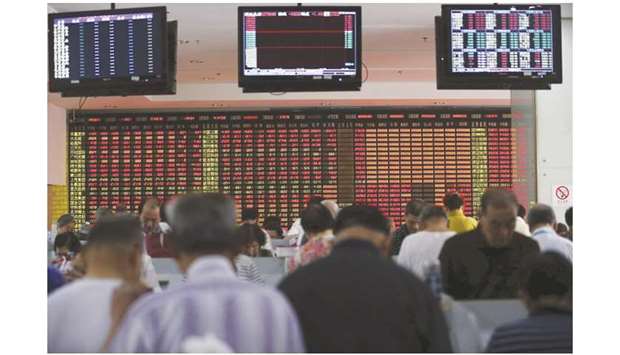Asian equities were mixed yesterday, having been rallying for the second day of the year on China-US trade optimism. Hong Kong fell 0.3%, Shanghai ended down 0.1% and Singapore retreated 0.7%, while Mumbai eased 0.5%.
But there were gains in Sydney, Seoul, Wellington, Manila and Taipei.
Regional energy firms were the big winners, with Santos surging more than 2% in Sydney and while Hong Kong-listed PetroChina climbed 2.8%.
Markets had all been well up before news of the strike, thanks to ongoing optimism fuelled by the China-US trade agreement, looser central bank monetary policies and easing Brexit worries.
“Investors are worried that the situation in Iran will worsen, since there could be some retaliation,” said Steven Leung at Mizuho Bank. “People will want to cut risk ahead of the weekend.
Stocks have rallied a lot in the past month or so, so any bad news flow is a reason to take profit.”
In early European trade London fell 0.5%, Paris lost 0.6% and Frankfurt retreated 0.8%.
In Hong Kong, the Hang Seng closed down 0.3% to 28,451.50 points and Shanghai — Composite ended down 0.1% to 3,083.79 points. Tokyo — Nikkei 225 was closed for a public holiday.
High-risk currencies retreated against the greenback, with South Korea’s won down 0.8%, Australia’s dollar off 0.6% and the South African rand down 1.7%.
Oil prices soared more than 4% yesterday following news that the US had killed a top Iranian general, fanning fresh fears of a conflict in the crude-rich region, with Tehran warning of retaliation.
The head of Iran’s Quds Force, Qasem Soleimani, was hit in an attack on Baghdad’s international airport early yesterday, according to Hashed Al-Shaabi, a powerful Iraqi paramilitary force linked to Tehran.
Later, Donald Trump tweeted a picture of the American flag, and the Pentagon said he had ordered Soleimani’s killing.
Iran’s supreme leader Ayatollah Ali Khamenei warned of “severe revenge” for “the criminals who bloodied their foul hands with his blood”, while the country’s foreign minister called the move a “dangerous escalation”.
Brent surged 4.4% to $69.16 and WTI jumped 4.3% to $63.84 as investors grow increasingly worried about the effects of a possible flare-up in the tinderbox Middle East on supplies of the commodity.
Both oil contracts later pared the gains but remained well up.
The crisis also comes as tensions between the US and North Korea worsen, with Kim Jong-un declaring a self-imposed moratorium on nuclear and intercontinental ballistic missile tests had ended, with US talks going nowhere.
“We are waking up to a less safe world than it was only hours ago, especially if we combine this with simmering tension in the Korean peninsula,” Innes added.
The drama sent investors rushing for the hills and safe-haven units rallied with the yen up 0.6% against the dollar and gold climbing 1.4% towards $1,600 and a near seven-year high.

Investors look at computer screens in front of an electronic board showing stock information at a brokerage house in Shanghai. The Composite index closed down 0.1% to 3,083.79 points yesterday.
